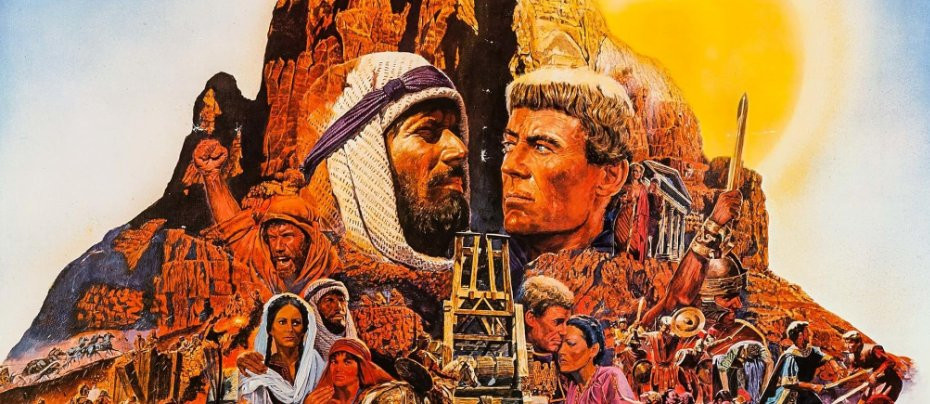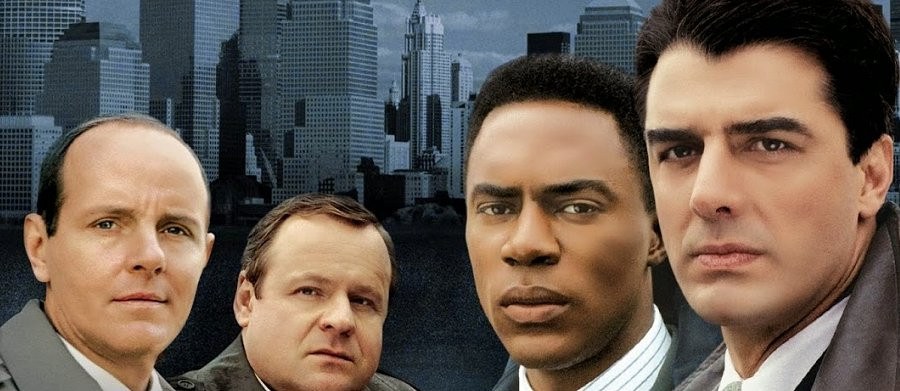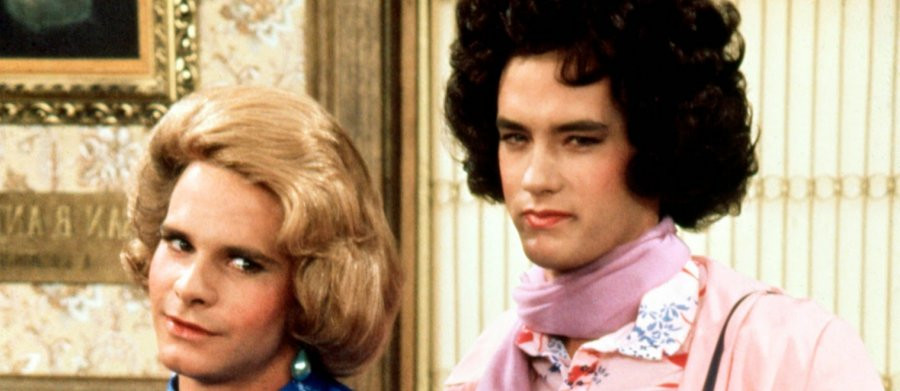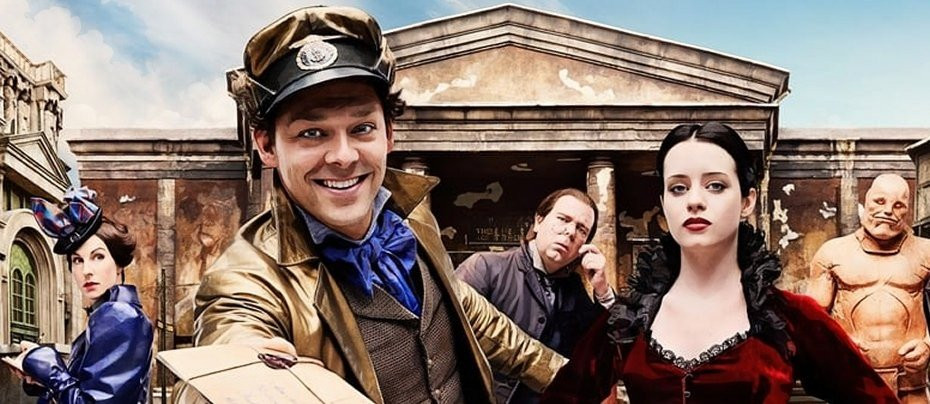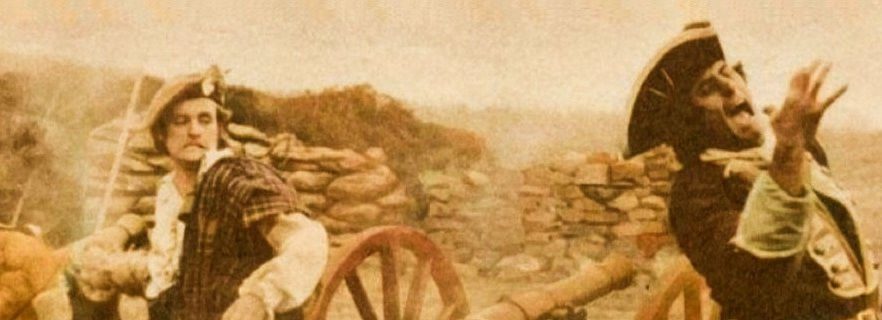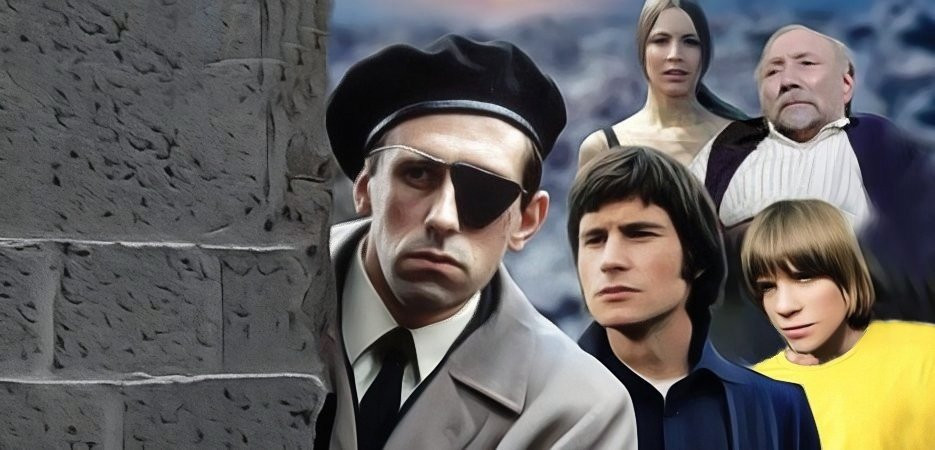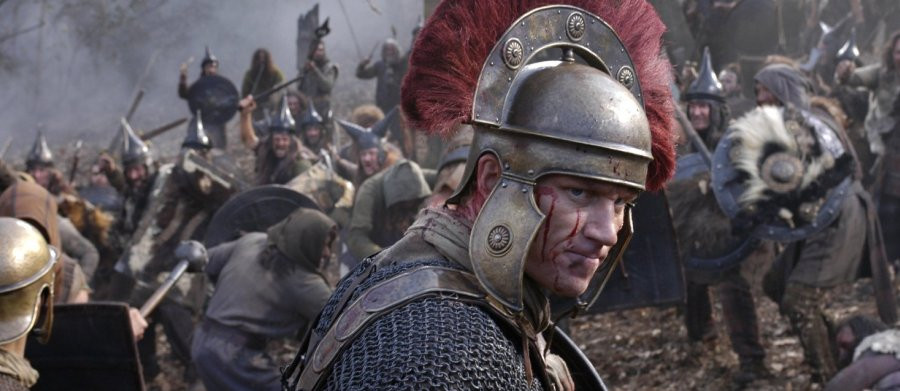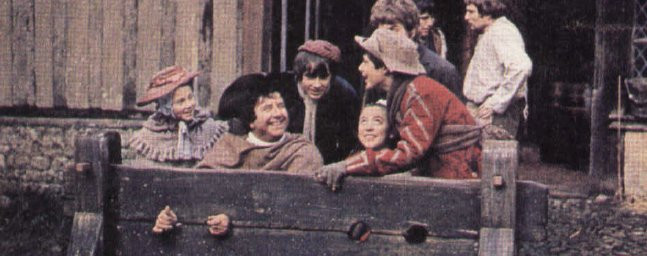
Oppenheimer
1980 - United Kingdom'an overall style that is so genuinely realistic'
Oppenheimer review by John Winterson Richards
The success of the recent Christopher Nolan feature film Oppenheimer encouraged the BBC to go down to their vaults and dust off their 1980 miniseries of the same name. At the time of writing it is currently available on BBC iPlayer and highly recommended. Not only does it rival the acclaimed film, there is a case for saying it is the better written production. It will certainly prompt anyone who takes either history or drama seriously to ask when television forgot how to write historical drama properly like this.
The television Oppenheimer is compelling because it is authentic. The production makes a constructive contract with the viewer that everything they see will be true or at least consistent with what we know of the truth. It keeps that agreement, and as a result, has far more dramatic impact than any fiction. Diligently researched, it uses its learning not to show off but to tell the truth. If there are, as always, matters of interpretation one might debate, it is difficult to find errors of fact. Your reviewer, the sort of dull person who likes knowing historical trivia, was relieved when he finally spotted what seemed like a mistake at the very end - but it turns out the script was accurate after all (it was in fact President Kennedy who approved Oppenheimer's Fermi Award but Johnson who made the Award almost immediately after Kennedy's murder).
The first episode gets off to an unpromising start, with overly dramatic music, 1970s sets, a clunky voice-over narration, and the introduction of a lot of young white male supporting characters whom it is difficult to tell apart. However, the production values and the writing, relying almost exclusively on dialogue, soon get a lot better, and in the meantime, the show is carried by a mesmerising performance by its leading man as the eponymous Robert Oppenheimer, the "Father of the Atomic Bomb."
The BBC seem to have been rather pleased to secure the rising American star Sam Waterston. He was then hot from The Great Gatsby and Capricorn One, and it was generally agreed that great things lay ahead of him. The opening title proclaims, "Sam Waterston As Oppenheimer," not just "Oppenheimer," emphasising his prestige as an actor.

He is indeed perfectly cast. His subsequent roles, above all his long run in Law & Order, now make us think of a Waterston character as basically a straight arrow, so it is good to be reminded how versatile he is. Waterston and the scriptwriter, the novelist Peter Prince, explore every facet of a very complicated man over seven episodes, and they do not try to sanitise him. The resulting portrait is as unflattering as it is realistic.
Although it is not mentioned explicitly, the production makes it clear that Oppenheimer came from an affluent background and never lacked the resources to maintain a very comfortable lifestyle. He and his brother Frank had in fact inherited a considerable estate from their self-made businessman father, despite which both became extremely Left wing. The script does not attempt to hide the extent of Oppenheimer's involvement with the Communist Party, even if it does not really engage with the moral compromises that would have involved. The American Communist Party was totally subservient to Stalin, and remained so throughout the Holodomor, the Moscow Show Trials, Stalin's betrayal of his Left-wing allies in the Spanish Civil War, and Stalin's Non-Aggression Pact with Hitler. Although never a Party member as Frank was, Oppenheimer was at home in Communist social circles and a generous financial supporter of Communist front groups. He was not just some naive youngster who once went on a march.
The opportunity to lead the scientific research side of the Manhattan Project, the development of the atomic bomb in World War Two, seems to have revived his career ambitions. The script is right to suggest that he was something of an intellectual dilettante, and that the breadth of interest that proved to be his greatest asset in bringing together all the different aspects of the Manhattan Project had rather distracted him from concentrating on making a great discovery of his own. As a result, he was past his prime as a theoretical physicist when the Project came along and offered him a last chance to achieve something worthy of his talents. Once there, he also seems to have developed a taste for being at the centre of power.
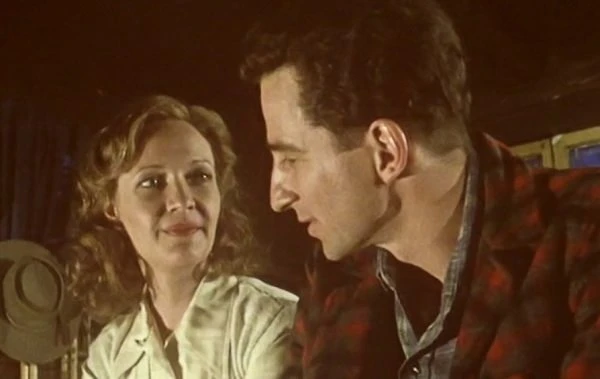
Waterston's Oppenheimer is therefore neither a hero nor a villain. He is an intellectual giant but a flawed human being, an egotistical womanizer. He likes being part of first the Communist scene and then the official hierarchy, but we are left to wonder if he ever feels any real commitment to either. For all the breadth of his interest, he is not a deep man.
He was appointed to the Manhattan Project at the insistence of its Director, General Leslie Groves. A career soldier and military engineer, Groves had the reputation of a man who would get the job done, not caring about what rules he had to break and whom he offended. Although far from stupid, he felt understandably out of his depth among some of the great scientific minds with whom he had to deal - a point well made at the end of a beautifully judged meeting scene. He selected Oppenheimer over several far more prestigious candidates to lead the scientists because he saw him as a more intellectual version of himself, an ambitious leader who would do whatever it took to finish the job. It was his best decision.
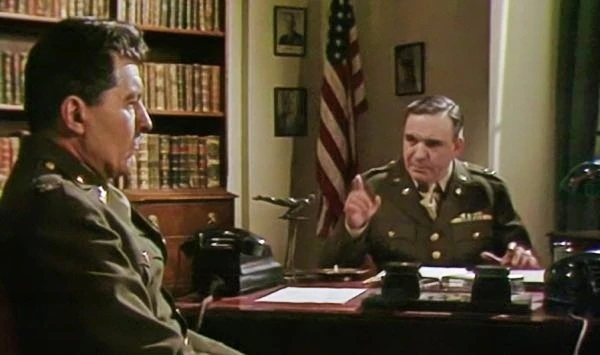
That Groves was capable of such unorthodox and insightful decisions shows he was far from the cliche of the narrow-minded professional officer. Manning Redwood, a British-based American character actor whose face is familiar from Bond movies and the like, plays him with great integrity. At one point he gives a patriotic speech whose simple-mindedness is later mocked by Oppenheimer's sophisticated friends, but it turns out to be perceptive: it was the fact that America attracted scientists from all over the world that proved decisive. British viewers of the time would have recognised other American expats in the UK who were no strangers to their television sets, including Ed Bishop (UFO, Whoops Apocalypse) as Groves' Deputy, Bob Sherman (The Sandbaggers) as Oppenheimer's Berkeley colleague Ernest Lawrence, and William Hootkins (Star Wars, The Life and Times of David Lloyd George) as an FBI Agent.
Barry Dennen is suitably Rabbinical as Oppenheimer's more down to Earth counsellor Isidor Rabi. The prolific British character actor Edward Hardwicke, later best known as Dr Watson in the definitive Sherlock Holmes, is not obvious casting as Rabi's fellow Nobel Prize winner Enrico Fermi, and his make-up might not be "acceptable" today, but he immerses himself so successfully in his role that one soon forgets it is him. He has a couple of subtle moments in meetings that prove of great importance.

In spite of this very strong competition, by far the best performance, dominating even Waterston, comes, predictably, from David Suchet as Edward Teller, the "Father of the Hydrogen Bomb." Suchet has since become the definitive Poirot, which keeps him in canal boats (his hobby), but this does overshadow his other accomplishments: as with Waterston, it is good to be reminded of his versatility. His Teller is at first the classic cheerful, garrulous, socially awkward science professor. Only gradually does it become apparent that he is even more ambitious, intelligent, and manipulative than Oppenheimer himself. It all culminates in an immaculate "trial scene," the hearing on Oppenheimer's security clearance, at which the words that effectively end Oppenheimer's public career are wrung out of Teller apparently with enormous reluctance. It is impossible to say to what extent this is deliberate - or if Teller knows himself.
His performance is all the more remarkable because at the time Teller was still alive and very influential. Indeed that influence was to grow over the next few years after Ronald Reagan became President and Teller his trusted adviser on nuclear weapons strategy. Teller's voice was decisive in favour of the "Star Wars" Strategic Defence Initiative. Nuclear weapons strategy was in general a very hot political topic when Oppenheimer was written and shown, and the Campaign for Nuclear Disarmament (CND) was growing in influence, not least in media circles. It is therefore greatly to Prince's credit that the script sticks close to history, putting different sides of arguments as they were made at the time the drama is set, resisting the urge to be "relevant." Sadly, one cannot imagine similar restraint in a television script today.

Nor can one imagine in a historical drama show today an overall style that is so genuinely realistic, in the sense of reflecting how people in responsible positions actually act, or acted in their period, as opposed to the histrionics too often labelled "realism." For all their suppressed emotion, the people who worked on the Manhattan Project were all adults accustomed to social and professional hierarchies. The various meetings and hearings are formal, controlled, and calm, but they are no less dramatic for that. The final "trial scene" is a masterpiece, clarifying exactly why Oppenheimer lost - and perhaps rightly so. If there is a criticism of the script, it is that, like practically every other dramatisation of the "Red Scare" of the 1940s and 50s, it fails to make it clear that Americans had every reason to be scared. A brief cameo by Klaus Fuchs and a reference to Stalin not looking surprised when he was told about the atomic bomb is not enough to show how thoroughly the Manhattan Project was infiltrated by Stalin's spies. Oppenheimer was not to blame but in retrospect, one can see why the authorities were concerned about his judgement. The script is daring but honest to suggest that Oppenheimer may have enjoyed playing the role of martyr as he enjoyed playing other roles.

Nor is Oppenheimer any less dramatic for relying almost exclusively on dialogue. There is very little "action." Indeed, the dialogue is the action. Again one cannot imagine that on television today, but the proof that it can be compelling is here to be seen. The scenes leading up to the "Trinity" test maintain the tension exquisitely in spite of the fact we know how it turned out (spoiler: the bomb explodes). After that shaky start, the production values, including extensive location work, are very impressive by television standards at the time. Two more expensive and strongly cast American dramatisations a decade later, Day One and Shadow Makers, do not ring as true or stick in the mind as well as this British telling of a quintessentially American story.
Seen this show? How do you rate it?
Seen this show? How do you rate it?
Published on August 11th, 2023. Written by John Winterson Richards for Television Heaven.


